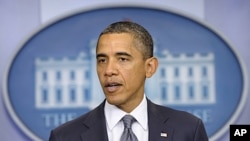President Barack Obama announced on Friday that all U.S. troops will be withdrawn from Iraq by the end of this year. The announcement came after months of negotiations with the Iraqi government on extending a U.S. troop presence there.
In a video conference with Prime Minister Nouri al-Maliki, Obama said he reaffirmed that the United States keeps its commitments, while Maliki spoke of the Iraqi people's determination to forge their own future.
The president said he had fulfilled a pledge he made as a presidential candidate to bring the Iraq war to a responsible end.
"Today I can report that as promised, the rest of our troops in Iraq will come home by the end of the year. After nearly nine years, America's war in Iraq will be over," said Obama.
He declared a formal end to the U.S. combat mission in Iraq last year. From a high of about 165,000 troops five years ago, about 39,000 troops remain. A U.S.-Iraqi agreement in 2008 set December 31 of this year as the date for complete withdrawal.
Between 2003 and this year, nearly 4,500 U.S. troops were killed in Iraq with some 32,000 wounded. Iraqi civilian deaths from years of sectarian conflict exceed 100,000, much higher by other estimates. At least 10,000 Iraqi soldiers also were killed in this conflict.
The U.S. and Iraq negotiated over a possible extension of the U.S. military presence, amid concerns about undermining progress as Iraqi forces assumed full security responsibilities.
Obama said the two countries now move to "a normal relationship," with U.S. civilians and diplomats in the lead, and discussions continuing about training and equipping of Iraqi forces.
White House officials said Iraqi forces have shown themselves to be increasingly competent and capable. Officials estimate that 4,000 to 5,000 private contractors will be providing security for U.S. diplomats and other personnel.
Though the White House notes that violence in Iraq has decreased 10 fold since a high point in the middle of the last decade, bombings and other attacks have continued on an almost daily basis.
Obama said Iraq still faces some tough days to come.
"There will be some difficult days ahead for Iraq, and the United States will continue to have an interest in an Iraq that is stable, secure and self-reliant," said the president.
The president made a point of saying the U.S. insists that other nations respect Iraq's sovereignty, seen as a reference to concerns about expanded Iranian influence in Iraq.
Deputy National Security Adviser Denis McDonough, who recently was in Iraq, said the U.S. is confident in the ability of a sovereign Iraq to stand up for itself.
"We don't have concerns about our ability to make sure the Iraqis can exercise the kind of sovereignty that they want," said McDonough.
Democrats in Congress issued statements praising Obama for fulfilling his pledge to bring a long and difficult conflict to an end.
Republican House of Representatives Speaker John Boehner praised American troops, and the leadership of both President Obama and President George W. Bush for freeing Iraq from "a vicious tyrant" and ending a violent terrorist insurgency.
But Boehner said he remains concerned that a full withdrawal could jeopardize security gains.
Republican Senator John McCain called the decision a harmful and sad setback for the United States, saying it will be viewed as a strategic victory for U.S. enemies in the Middle East, especially Iran's government.
Obama: All US Troops Out of Iraq by Year End
- By Dan Robinson





